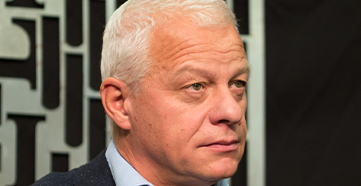|
|
The IBA’s first live webcast of 2015 featured Viviane Reding MEP, former EU Vice-President and the first Commissioner responsible for Justice, Fundamental Rights and Citizenship, broadcast live from the European Parliament on 17 March.
Litigating in the Asia Pacific Region
The IBA’s first live webcast of 2014 featured Michael Kirby, Chair of the UN Commission of Inquiry on Human Rights in North Korea. The former Australian High Court judge discussed the findings of the report, his methods of inquiry and what steps can be taken to bring accountability for the gross human rights abuses perpetuated by the Pyongyang regime. He also gave views on the global ‘war on drugs’, his work with the Joint UN Programme on HIV and AIDS and efforts to get worldwide reform for anti-gay laws
By invitation only: IBA Mid-Year Leadership meetings 2024
Q&A session with the IBA's President and Executive Director
All IBA officers of sections, committees and fora are invited to attend this Q&A session on how to be a successful officer, best-practices guides by fellow officers, and the opportunity to network with other committee officers.
By invitation only: IBA Mid-Year Leadership meetings 2025
This webcast and audience Q&A with Paul Rawlinson, Global Chairman of Baker McKenzie, covered law firm strategy and culture, as well as topical issues such as the potential effects of Brexit and a Trump presidency
This session will take the form of an interactive roundtable, with each table hosted by a managing partner from a leading Latin American law firm. Participants will have the opportunity to engage directly with the managing partners, gaining personal insights into their journeys to leadership and the skills, challenges, and lessons learned along the way.
Topics to be discussed at each table include:
• navigating firm politics and partnership dynamics;
• building a personal brand and network within the region;
• leadership styles that resonate in Latin America;
• fostering diversity and inclusion at the top; and
• perspectives on preparing future firm leaders.
IBA Next Generation Legal Summit: Building your professional future in a changing world – a law firm management perspective
Aug 22, 2016
This webcast and audience Q&A with Funke Abimbola, General Counsel of Roche UK, explored the corporate compliance challenges facing the leading biotech company and the evolving role of in-house lawyers.
The interview examined the legal aspects of supporting Roche’s pharmaceutical R&D and healthcare strategies, addressing issues such as company operations, risk management, and diversity in the profession. The interview was conducted by the BBC's Sally Bundock.
Alison Taylor, a Clinical Associate Professor at the New York University Stern School of Business and Executive Director of Ethical Systems, recently published Higher Ground. In an interview with Nicola Bonucci, Alison will examine her acclaimed book’s main themes, including why running a business has become so complicated and how businesses can act responsibly in the modern world.
20th Annual IBA Anti-Corruption Conference
The third IBA webcast of 2015 featured José Ugaz, Chair of Transparency International (TI), and was broadcast live on 10 June. Ugaz is one of the world’s leading anti-corruption lawyers, During his time as Ad Hoc Attorney General of Peru, Ugaz prosecuted hundreds of government officials. He led the corruption case against the former President of Peru, Alberto Fujimori, who is currently serving a 25-year prison sentence.
Next Gen Arbitration in Asia Pacific: Innovation, access, and legacy
Jun 06, 2016
This webcast with Drago Kos, Chair of the OECD Working Group on Bribery, covered timely issues in anti-corruption, including relevant aspects emerging from the Panama Papers as the OECD commenced the 4th phase of review under the OECD Anti-Bribery Convention.
The webcast was conducted by Jonathan Rugman, Foreign Affairs Correspondent at UK broadcaster Channel 4.
21st Annual IBA Anti-Corruption Conference
The second IBA webcast of 2015 featured James Palmer, Senior Partner of Herbert Smith Freehills, and was broadcast live on 24 April. Discussion covered law firm management and strategy, and corporate governance among other themes.
A dialogue between Andrea Appella and Professor Stefano Quintarelli.
The AI battlefields - How to navigate and overcome the legal challenges
Interview and Q&A with M Cherif Bassiouni, Chair, Bahrain Independent Commission Inquiry, at the IBA Annual Conference in Dubai. In discussion with Nick Clark of AlJazeera. Plus question and answer session
7th IBA Asia Pacific Regional Forum Biennial Conference
Jan 24, 2023
Grace Perez-Navarro is Director of the Organisation for Economic Co-operation and Development’s (OECD) Centre for Tax Policy and Administration. Here, she speaks to Global Insight about the key issues facing the OECD, from the implementation of its ‘Two Pillars’ tax reforms to ensuring that the interests of developing countries are protected.
• How are athletes’ rights and duties taken into account in modern sport?
• Gender equality in sports today: is it the beginning of a new era?
• The fight against racism and violence and for integrity: the example of FIFA.
• The specifics of ethics in sports: tools and objectives.
• The fight against doping: an old fight looking for a better outcome today?
• Sport as a soft power: is it a political instrument to further peace?
• Sanctions in sports and international trade: are we talking about the same creatures?
The Laws of Sports: fast and furious or stable and reliable?
Navi Pillay, United Nations High Commissioner for Human Rights, was the interviewee for a wide-ranging IBA webcast and Q&A, broadcast on Friday 30 May 2014 as part of the IBA's webcast series.
A South African of Indian Tamil origin, Ms Pillay served as the first non-white female judge of the High Court of South Africa and President of the International Criminal Tribunal for Rwanda before taking up her post at the UN in 2008.
Certain states and non-governmental organisations have voiced concerns about the use of international arbitration to resolve disputes involving complex environmental issues. Among the criticisms of investor–state arbitration is that arbitrators often fail to consider a state’s domestic and international obligations to safeguard the environment, sometimes even at the expense of the investors’ rights. Additionally, some jurisdictions in Asia have established arbitration-friendly legal frameworks, bolstering confidence for both Asian and non-Asian parties in selecting an arbitration seat. This Oxford-style panel will delve into these two issues. The house will provide some motions. One panellist will defend the motion and the other will rebut it.
• First motion: this house believes that the international arbitration legal framework is well-equipped to handle cases involving complex environmental issues.
• Second motion: ‘The Battle of Seats’ – this house believes that Asia-based seats will continue to increase in popularity in the coming decade.
IBA Arb40 Symposium: Salient issues in international arbitration
Sep 14, 2022
‘Did you conduct an internal investigation at the time?’ This is how an investigating judge questioned our client during a first appearance hearing concerning 20 year-old facts.
The legal world is facing a generational shift in expectations around work-life balance, purpose and firm culture. This session brings together law firm leaders who are rethinking how they hire, train, lead and retain talent. What’s working? What isn’t? And what do Gen Z lawyers really want?
Law Firm Management Committee Latin America Conference - Building the law firm of the future
Feb 17, 2023
This article will outline the development of China’s restrictions on the cross-border transfer of personal information (PI export), detailing PI export mechanisms provided by the Personal Information Protection Law. It will also explain the practical implications of the restrictions.
The session will explore how the rules and practice of international trade are evolving, as reflected in the expanded use of trade defence tools such as trade remedies, safeguards, unilateral tariffs and countermeasures, the return of managed trade arrangements and the reordering of global trading blocs. The session will be practical and forward-looking; it will focus on what lawyers need to know to help clients structure their supply chains and the extent to which domestic courts and international institutions like the WTO can offer meaningful recourse to protect parties’ interests in rules-based trade.
IBA Annual Conference Miami 2022

Jul 08, 2025
Mediation is on the rise internationally as a means to settle disputes in a cost-effective manner. Chinese parties appear to be increasingly interested in mediation as an option. This article examines the evolving landscape of mediation in China and internationally. It considers how mediation for Chinese parties is evolving and whether mediation is a good option for Chinese parties in cross-border disputes. Commercial mediation has seen remarkable growth, bolstered by a supportive PRC judicial system and legislative initiatives encouraging parties to find harmonious ways to resolve disputes. The article analyses the three primary types of mediation in China: people’s mediation, administrative mediation, and commercial mediation. It also looks at mediation rules and proceedings in common law jurisdictions, such as Hong Kong, Singapore, and the United States. The article anecdotally considers the cultural elements, emphasising the Chinese parties’ preference for evaluative mediation styles as a reflection of civil law. Through case studies of international disputes involving Chinese and US parties, the article illustrates the practical dynamics of mediation involving Chinese parties and underscores the importance of cultural sensitivity in international mediation. As Chinese parties continue to go global, mediation is emerging as an attractive option for efficient and cost-effective dispute resolution. This analysis assesses whether the promotion of mediation is yielding tangible outcomes and explores the future of mediation involving Chinese and foreign parties.
This session will discuss developments in the practice of litigation, including: (i) the landscape of disputes involving new currencies; (ii) disputes that create a conflict between the creditor and the shareholder; and (iii) the funding of disputes.
A review of emerging themes in ADR (2023 version)

Sep 27, 2023
The rise in popularity of generative artificial intelligence (‘generative AI’) has ignited the discussion on whether junior employees can be replaced by it. Some have gone to the extent of questioning whether professionals, such as lawyers, can also be replaced by generative AI. Is it wise to replace junior employees or lawyers with generative AI? What factors should be considered before deploying generative AI tools in your business? To consider these questions, we first need to understand the basic workings of generative AI and what it can offer. Fundamentally, AI is intelligence that is not biological. The general understanding is that machines will be ascribed with this intelligence. These machines have the ability to interpret, learn from and process external data in a way that is similar to the capabilities of the human mind. Generative AI is a type of AI program that generates content from a data set. It uses deep learning, a type of machine learning system that behaves like a neural network to simulate the functions of a human brain. In other words, it can mimic human intelligence by exhibiting analytical skills to create new content. Not only can generative AI be utilised in chatbot programs to create text, but it can also be used in programs that can create images, sound or videos. This article will consider two major forms of generative AI, in the context of risks to businesses: chatbots using generative pre-trained transformer technology programs; and image generating programs.
- Commercial arbitration: non-signatories sought to be joined, what limits are there?
- Sports arbitration: avoiding ‘forced arbitration’ for athletes
- Can we escape an arbitration agreement (vitiated consent,termination, etc)?
- Investment arbitration: issues of consent
25th Annual IBA Arbitration Day: 25 years together and now? Building the arbitration model for tomorrow
By Yi-An (Ann) Lai. Alipay and the impact of e-payment systems resulting in new regulations in China and other jurisdictions.
14th Annual IBA Real Estate Investments Conference
The role of the courts in arbitration: an Asia Pacific perspective
An interview with business and human rights lawyer, Stéphane Brabant, by Edie Hofmeister.
Whilst any lawyer will tell you that every M&A (mergers and acquisitions) transaction takes a course of its own due to its own individuality/sector, there are nevertheless a number of fundamental essentials which every M&A lawyer – whether newly qualified or otherwise – needs to know. During this session, our expert panellists will cover key topics which any newly qualified M&A legal professional can expect to encounter in their first years of legal practice, as well as sharing individual transaction challenges and successes.
The Fundamentals of International Legal Business Practice
Edie Hofmeister, Vice-Chair of the IBA Business Human Rights Committee, interviews the business and human rights lawyer Stéphane Brabant, a partner at Herbert Smith Freehills in Paris, about empathy in the corporate value system, putting forward new systems in business, and advice for new in-house counsel.
RuleOfLawFrom the outset of the pandemic, barristers and advocates recognised and were supportive of the attenuations to the justice system, which were necessary to ensure that justice could be delivered in the circumstances, which prevailed. In that context, it was accepted that remote hearings were necessary to ensure that system of justice continued to function. These remote hearings and other arrangements were however introduced as part of an emergency response. There was no time to gather any of the necessary stakeholder requirements nor to consult, design, test and implement a reformed system that would ensure these requirements were met in a sustainable manner. Against this background, it should not therefore come as a surprise to find that, for some, although the reforms that have been introduced have successfully avoided justice grinding to a standstill, they have not achieved the necessary or optimal levels of suitability or practicability and have arguably weakened adherence to some core principles of justice. Indeed in several areas the changes introduced have been regressive, limiting and jeopardizing access to justice and introducing impediments to the proper conduct of court proceedings.
This session will examine the benefits and drawbacks of the new ways conducting trails during the pandemic and try and assess their overall impact. Speakers will reflect a variety of different jurisdictions and perspectives
IBA Annual Conference Miami 2022
Apr 28, 2023
I. Stephanie Boyce on her 'interesting and unconventional' route to law, addressing diversity issues in the profession, in-house counsel, legal aid, law reform and litigation
7th IBA Asia Pacific Regional Forum Biennial Conference
Nov 14, 2024
A session report from the diversity and inclusion session at the IBA Annual Conference in Mexico City.
This panel will discuss developments related to the allocation of risk and responsibility for Pillar 2 tax in the context of business combination and investment, the challenges associated with participation exemption and credit regimes within the Multinational Enterprise (MNE) group and issues and tips with respect to the preparation and filing of the GLOBE return.
IBA Annual Conference Toronto 2025
Jan 27, 2025
A report on the panel session ‘To list, to sell or to flip to the US: sucessful exist methods in Europe’. Participants discussed recent challenges in the initial public offerings market, the ‘dual-track’ strategy and the role of legal advisors among other interesting points.
This panel will discuss the impact of the change of leadership in the United States, Canada and Mexico, on the review of the North American’s free trade agreement (the United States–Mexico–Canada Agreement), scheduled in 2026. The previous revision introduced ground breaking changes, including the thorough supervision of labour standards at a company level. What will the next revision bring?
IBA Annual Conference Toronto 2025
May 21, 2024
The 26th Transnational Crime Conference, which took place between 8–10 May 2024 in Milan, Italy, was a resounding success. In fact, it has become the most well-attended international criminal law conference in the IBA’s history!
A number of jurisdictions have enacted new restructuring regimes in the recent years. Such regimes provide different features, many times adapted to the particular circumstances of the applicable jurisdiction. The purpose of this panel would be to offer an oversight of certain of those restructuring regimes, and to assess, in the light of their applicable features, which ones would suit better equity holders, creditors, debtors, employees and other eventual stakeholders with an interest in the restructuring process.
28th Annual IBA Global Insolvency and Restructuring Conference - Restructuring vs Insolvency
Jul 18, 2023
A report of the 25th Transnational Crime Conference, held 3–5 May 2023 in Boston, Massachusetts.
This session will discuss developments in mediation, including: (i) the advancement of hybrid dispute resolution processes; (ii) the application of artificial intelligence (AI) in mediation; and (iii) ethics governing lawyers and mediators in a mediation process.
A review of emerging themes in ADR (2023 version)
Apr 23, 2025
Arriving in Budapest, I was excited to join my first IBA European Regional Forum (ERF) retreat as a council member. Bringing together over 50 officers, council members and Advisory Board members, this was a great (and slightly daunting!) opportunity to immerse myself in the ERF and find out more about their current and upcoming projects.
Advancements in technology are changing lawyers’ work as we've known it. Whether the legal profession will successfully navigate the myriad of problems and opportunities arising in the digital space remains to be seen. AI ranks at the top of the IBA’s strategic plan and many other organisations’ priorities. This panel, composed of regulators, industry experts and lawyers, will delve into how the legal services landscape is changing amidst regulatory developments across various jurisdictions.
IBA Annual Conference Mexico City 2024
Jan 13, 2025
The IBA’s Criminal Law Section (made up of the Criminal Law, Business Crime, Anti-Corruption and Asset Recovery Committees) has closed 2024 with another successful conference; this time in Mexico City, where around 5,000 delegates gathered to exchange ideas, discuss the latest hot topics in the legal world and – of course – experience Mexican food, music and culture (including a memorable trip to a Lucha Libre wrestling competition).
IBA Young Lawyers' Committee Training: Becoming a champion
Apr 23, 2025
The 5th European Automotive and Mobility Services Conference, held on 26–27 March 2025, at Upside East in Munich, Germany, brought together industry leaders, experts and stakeholders to address the pressing challenges and opportunities within the automotive and mobility services sector. The conference provided a platform for in-depth discussions on supply chain issues, the transition to electric vehicles, the role of artificial intelligence and the evolving regulatory frameworks impacting the automotive industry.
Defenders in decline: human rights lawyers at risk in Southeast Asia
Jul 22, 2025
From 11–13 June, leading legal experts in life sciences and healthcare convened at the Ritz-Carlton, Boston, for the 11th Annual IBA World Life Sciences Conference. The event, co-hosted by the IBA Intellectual Property and Healthcare and Life Sciences Law Committees, brought together regulators, corporate counsel, private practitioners and academics to address the most pressing developments at the intersection of law, innovation and global health. This articles considers the key themes and panel highlights of the conference.
ESG regulatory developments and key issues in the Asia Pacific region
Jul 14, 2024
The European Fashion and Luxury Law Conference, meticulously organised by the European Regional Forum (ERF) of the International Bar Association (IBA) in Milan on 23 April 2024, was a resounding success. The event, which was fully booked, showcased a remarkable assembly of speakers, each highly esteemed within the industry. These speakers brought with them a wealth of knowledge and expertise, which they shared across a series of discussions and presentations.
Communicating across cultures involves recognising and bridging differences in communication styles, values and behaviours shaped by diverse cultural backgrounds. Effective cross-cultural communication is essential in today's globalised world, offering both significant benefits and potential challenges. The power of cross-cultural communication includes enhanced collaboration and teamwork, broader perspectives being introduced to enrich the decision-making process and market expansion for businesses. The risks and challenges of cross-cultural communication includes misunderstandings and conflict, stereotyping and oversimplification of cultural issues, and language barriers. By acknowledging the complexities of cross-cultural communication and actively working towards understanding and adaptation, employers can leverage the strengths of cultural diversity while mitigating potential pitfalls. Our speakers will discuss how we can assist employers in developing strategies for effective cross-cultural communication both internally and externally, and how we can enhance diversity and equality in the workplace.
Annual IBA Employment and Diversity Law Conference 2025
Apr 23, 2025
We were happy to see 110 participants in Munich on 27 March, in the unique location of Upside East for a day of discussions concerning the very challenging times that the automotive industry is now facing. Attendees had a chance to ease into the conference at the welcome cocktail which took place the evening before and it was good to see many familiar faces showing that the conference is becoming a familiar item on the IBA calendar.
This session will explore the need, and potential requirements, for an international commercial court in Asia. The panel members will discuss the work of the Singapore International Commercial Court, the China International Commercial Court, the Dubai International Commercial Court, and the Qatar International Court to assess their development since inception and analyse their importance in the global marketplace. In addition, the panel members will discuss recent developments of other commercial courts across Europe and the Middle East with the aim to ascertain how effective these commercial courts have been in managing and resolving global disputes.
Litigating in the Asia Pacific Region
|



















